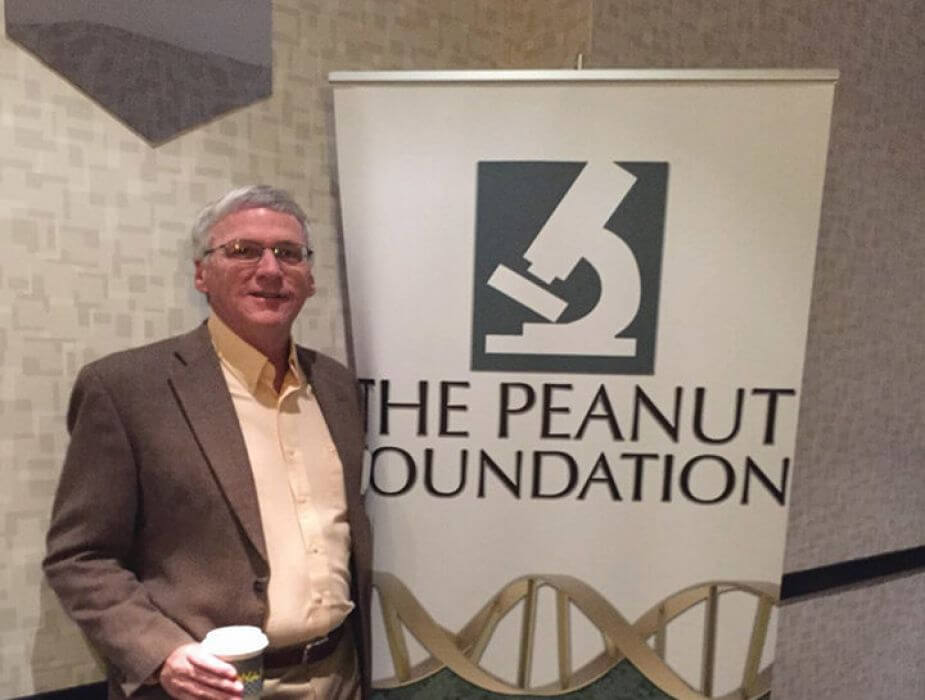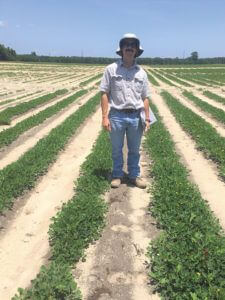
(Featured Image) Steve Brown, The Peanut Foundation executive director, says growers have a lot of clout in Washington D.C. “When growers make their voice heard through their local organizations, I think it carries a lot of weight in the halls of Congress.”
Stewardship goes further than complying with rules and regulations.
The idea of product stewardship is not new in the ag industry. Everyone knows it’s good to be kind to the land, give a crop a fighting chance and protect an investment from start to finish.
But stewardship involves more than an arsenal of crop protection products and a prayer that things will turn out reasonably well by the end of the season. It also involves a proactive approach from the field to Washington D.C.
Simply keeping a product on the market is a daunting challenge, says Steve Brown, Peanut Research Foundation executive director. “You want to protect your privilege to use a product to produce crops. Stewardship and understanding of the products and how to handle them is critical for keeping products on the market.”
Proactive Stewardship At The Top
When AgLogic Chemical Co. decided to bring aldicarb (formerly branded as Temik) back to the market, leadership decided upfront that product stewardship would be not only forefront, but also mandatory. Currently, anyone buying, selling or applying AgLogic aldicarb must pass a written certification test designed to reinforce the understanding of product stewardship. The intent was obviously not to make it more difficult to sell the product, but to reinforce the importance of complying with all regulations regarding its use.
“In our current modern world of agriculture, you have to go through re-registration every so often,” Brown says. “You’re building a record the whole time you’re out there on the market. Every time there’s a misuse or a complaint, it goes into a file. It’s a black mark against you. It can be any kind of product.”
A Voice To Be Heard
Stewardship goes further than complying with the rules and regulations. It’s also the idea of standing up for science and the merits of a product. While that concept is not new, it’s become increasingly important to maintain product availability across the entire agricultural industry.
That means getting involved, according to Vern Crawford, long-time former Pest Control Advisor (PCA) with Wilbur-Ellis in Shafter, California. Now retired, he still advocates for the responsible use of pesticides in the industry and the importance of getting involved from the grower level up regardless of how small one grower might think his or her voice might be.
“I’ve seen it a lot of times over the course of my career,” Crawford says. “Growers tend to want to concentrate on their strengths — production and equipment — and leave the marketing and industry oversight to others so they can stay focused on the furrows and the equipment. However, it’s just as important to take a stand in policy that affects the industry.
“Growers shouldn’t just leave it up to a company that markets a product,” Crawford says. “First and foremost, they need to adhere to the regulations, but also be an advocate to maintain continued use of products when that use is beneficial to their individual operation and the industry.”
What some growers take for granted is the power of a single voice and the synergy created when that voice, along with others, are united on a local level.
“Growers have a lot of clout in D.C.,” Brown says. “It may not be as much clout as they would like to have, but when a grower goes to Congress and says ‘this product is vital to my livelihood, and we can’t grow good crops that are important to our country without it,’ that gets more attention than a company going and saying we want to sell this product because it fulfills an important need to the industry.
“It carries more weight,” Brown says. “When growers make their voice heard through their local organizations, I think it does carry a lot of weight in the halls of Congress.”
Brown has considerable experience with aldicarb when it was marketed as Temik (now as AgLogic.)
“I worked with aldicarb when I was a peanut entomologist years ago,” he says. “I think Temik was probably the No. 1 use of aldicarb because of peanuts, cotton and pecans in the state of Georgia. It was one of the best options we had for early season pest control in those crops.”

(Image Left) Dan Anco, Clemson University Extension peanut specialist, says, “Pesticides are an important tool in our integrated management of peanut. Whether interest seeks greater efficacy, practicality or cost-effectiveness, the voice of farmers is vital to keeping our research activities relevant and applicable.”
Driving Research And Laying A Foundation
Stewardship and grower participation is also critical at the many research stations located across the nation. Without the science and field data to back a crop protection material, that product would not be available to growers. Although research may seem far removed from the grower level, it’s not, according to Dan Anco, Clemson University Extension peanut specialist and associate professor at the Edisto Research and Education Center.
“The research of my program is directly driven by farmer input and needs,” he says. “When farmers share their concerns, it is my duty and interest as a land grant researcher to address these issues. I get both direct input talking to individual farmers, as well as current research needs and priorities from organizations such as the South Carolina Peanut Board.”
The importance of that participation from the grower level up cannot be underestimated, Anco says.
“Pesticides are a very important tool in our integrated management of peanut. Whether interest seeks greater efficacy, practicality or cost-effectiveness, the voice of farmers is vital to keeping our research activities relevant and applicable,” he says. “It keeps us grounded, and the mutual, sincere exchange of ideas and legwork continues to fine tune the direction of our efforts.” PG